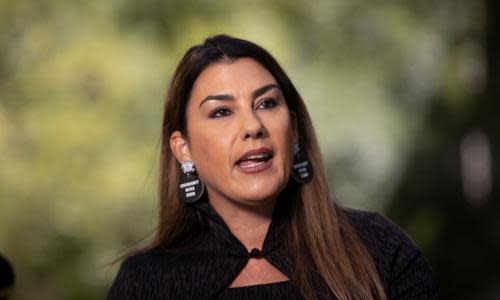Lidia Thorpe quits Greens party to pursue black sovereignty

Victorian senator Lidia Thorpe has announced she is quitting the Greens and will move to the crossbench.
Thorpe made the announcement at a press conference in Canberra on Monday afternoon, after it was initially reported by Guardian Australia.
Related: Greens expected to support Indigenous voice to parliament after Lidia Thorpe quits party
“I have told Greens [leader] Adam Bandt and the Senate president that I am resigning from the Greens to sit on the Senate crossbench,” Thorpe said.
“This country has a strong grassroots black sovereign movement, full of staunch and committed warriors, and I want to represent that movement fully in this parliament. It has become clear to me that I can’t do that from within the Greens.
“Now I will be able to speak freely on all issues from a sovereign perspective without being constrained by portfolios and agreed party positions.
“Greens MPs, members and supporters have told me they want to support the voice. This is at odds with the community of activists who are saying treaty before voice.”
Thorpe said her “ancestors and matriarchs” had urged her to “keep infiltrating” and “keep [their] fight alive”.
Thorpe said she would not reveal how she would vote on the voice to parliament. She has previously said she would oppose the body unless she is satisfied that it “guarantees First Nations sovereignty is not ceded”.
Thorpe thanked Bandt and the deputy Greens leader, Mehreen Faruqi, who she said had been “strong allies” and had supported “pushing the government to go further on truth and treaty”.
Thorpe said she did not “intend to comment further” about her time in the Greens, ending the statement to media without taking questions.
Sign up for Guardian Australia’s free morning and afternoon email newsletters for your daily news roundup
Greens party room members have grappled with the possibility that Thorpe could quit for the crossbench since her public commentary criticising the referendum to entrench the Indigenous voice in the constitution and formal notification that she cannot support the voice to parliament unless it is combined with recognition of Indigenous sovereignty.
Under an agreement struck in the party room last week, Thorpe was given free rein to vote against the proposal while the Greens decide if they will support the referendum. They are expected to announce their stance this week.
Bandt said he was “truly sad” that Thorpe had quit.
“I said to Lidia that I felt she could continue to advocate for black sovereignty within the Greens,” he told reporters in Canberra. “She’s obviously come to a different view.”
Bandt revealed he had offered for Thorpe to remain the Greens’ first nations spokesperson, proposing that he take responsibility for the voice while respecting her right to take a different position to the party on that issue.
Bandt said the Greens wanted “progress on all elements of the Uluru statement from the heart”, but he would not “pre-empt” the party’s final position on the voice referendum.
Anthony Albanese, constitutional experts and the expert working group have said the voice will have no bearing on First Nations sovereignty.
Thorpe wrote to the attorney general, Mark Dreyfus, with a 1 February deadline requesting further assurance, such as formal recognition that Indigenous sovereignty was never be ceded in the referendum bill.
While the Albanese government is progressing all three elements of the Uluru statement from the heart, Labor regards the Greens’ policy to pursue truth, treaty and voice in that order as a risk to the yes campaign in the referendum.
In October Labor set aside $5.8m to start work on setting up a Makarrata commission, which would “oversee processes for agreement making and truth telling”.
Although Bandt and Faruqi had previously backed Thorpe continuing as the First Nations spokesperson on the basis the voice is a small part of the portfolio, party room members privately questioned whether that was viable in the year of the referendum campaign.
Last week the Greens held a two-day retreat in Mount Macedon to discuss their 2023 strategy. Despite reports that Thorpe would take part remotely, Guardian Australia understands the Victorian senator did not participate.
In November Thorpe put her name to the establishment of an inquiry into Indigenous bodies pushed by some of the Coalition’s most strident opponents of the voice, before being forced to withdraw by Bandt and party colleagues.
Thorpe blamed an “administrative error” for her support for the motion, which is due to be voted on as early as Tuesday, after Monday’s Senate business was delayed by condolence motions for former senator Jim Molan.
Thorpe entered the Senate in September 2020, filling the vacancy of former Greens leader Richard Di Natale. She was re-elected at the 2022 election to a fresh six-year term to expire in 2028.
Bandt claimed the situation was “still more or less the same in the Senate” with Greens support necessary any time the opposition does not agree with the government.
The enlarged crossbench will mean Labor needs the 11 remaining Greens and two extra votes to pass bills in the upper house, forcing it to rely on a combination of independent David Pocock, the Jacqui Lambie Network, Thorpe, One Nation or the United Australia party.
On Monday Thorpe said she would continue to vote with the Greens on climate.

 Yahoo Movies
Yahoo Movies 